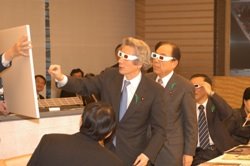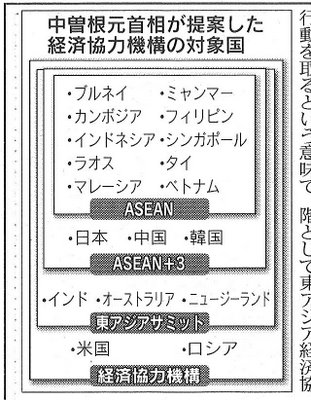David Pilling has a king-sized Comment & Analysis article in today's Financial Times (sorry, no link yet).
A journey together: how Koizumi has won US trust for a revitalised JapanO.K., so it is an off-kilter locution -- "the brightest U.S.-Japan relations in decades" -- making me think too much of R.E.M.'s "Shiny Happy People". Still, not a bad article--worth checking out in full.
Financial Times
Junichiro Koizumi is a prime minister rather than a head of state so he is not entitled to a 21-gun salute in Washington. He will have to make do with 19.
But in every other respect, the Japanese leader, who arrives tonight for a farewell US trip before stepping down in September, will be treated like a king.
So much so that President George W. Bush has found time to escort Mr. Koizumi to the former home of America's own King, Elvis Presley. Taking Mr. Koizumi, a lifelong Presley fan, to Graceland symbolises the warmth of the bond between the two. Together, they have built what officials on both sides proclaim to be the brightest U.S.-Japan relations in decades.
And yet...something is missing. Something ineffable, something on the tip of my tongue...yet strangely inexpressible.
Let us see...quoted in the article are:
Thomas Schieffer
Michael Green
Kurt Campbell
"one admiring U.S. official"
Gerald Curtis
and wait, two paragraphs from the end...Hama Noriko! Oh, darn, not really a quote:
Noriko Hama, professor at Doshisha University in Kyoto, is far from alone in arguing that engaging properly with China will necessarily mean reshaping Japan's relations with the US. She wonders how successful any overtures to Beijing can be when Japan is busily acquiring US missile technology apparently aimed at containing China's ability to project power.Did Professor Hama actually say such a thing? Without quotation marks, we will never know.
Oh wait, there is also a reference to Shinzo Abe "hinting" at something:
Potential successors to Mr. Koizumi appear receptive. Even Shinzo Abe, frontrunner and an enthusiastic pilgrim to Yasukuni, hinted in a recent interview with the Financial Times that he might suspend visits to the memorial.I know it is hard to be a journalist in Tokyo--everyone is so careful about what he/she is willing to say on the record.
Nevertheless, publishing a 3/4 page broadsheet article on Japan-U.S. relations without even a single direct quote from a Japanese source seems to assume the FT readership either cares only what Americans think of the world or will not notice that America's "dialogues with its friends" are no more than soliquies before an audience of mutes.




